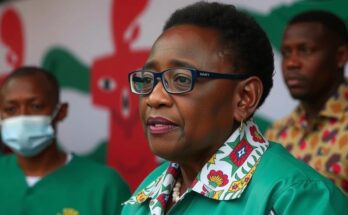A Kenyan court has ruled that the impeachment proceedings against Deputy President Rigathi Gachagua are constitutional, allowing the Senate to initiate a trial. Gachagua faces eleven charges, including corruption and incitement, which he has vehemently denied, labeling them a politically motivated attack. A ruling is expected soon, and a two-thirds majority in the Senate is required for his removal, which would be a historical first since the 2010 constitution was enacted.
In a significant development in Kenyan politics, the Senate is poised to initiate deliberations concerning the impeachment of Deputy President Rigathi Gachagua following a recent court ruling affirming the constitutionality of the impeachment proceedings. Last week, the National Assembly passed a decisive vote to impeach Gachagua on eleven charges, including allegations of corruption, undermining government authority, and inciting ethnic tensions. Despite the accusations, Deputy President Gachagua has firmly denied the charges, framing the impeachment motion—backed by opposition lawmakers and allies of President William Ruto—as a politically motivated attack characterized by unfounded claims. According to court documents reviewed by the Reuters news agency, Gachagua described the proceedings as a “political lynching.” Gachagua’s appeal against the impeachment in the high court was met with a ruling by Judge Eric Ogola, who stated that the constitutional process may proceed into the Senate, where a trial will be held to address the issues raised in court. Judge Ogola asserted, “At this stage, the process is a lawful, constitutional process, and the Senate will conduct a trial where all the issues being raised before the court will be raised and determined at the moment.” A decision on the impeachment is anticipated by Thursday, and a two-thirds majority vote will be required in the Senate to remove Gachagua from office. The Senate commenced meetings last week, and discussions on the motion began in private sessions on Wednesday. If the impeachment is successful, Gachagua would mark a historic precedent as the first deputy president in Kenya to be ousted via impeachment since the 2010 constitutional amendments. Having previously emerged from a myriad of corruption allegations to assume the deputy presidency alongside President Ruto in the tightly contested August 2022 elections, Gachagua played a pivotal role in mobilizing support from the influential Kikuyu community. However, the political landscape has changed as tensions between him and President Ruto have surfaced, particularly following Gachagua’s criticism of being marginalized within the government and allegations of his involvement in youth-led anti-government protests. These protests erupted in response to rising tax burdens, resulting in over fifty fatalities and prompting President Ruto to restructure his cabinet by including opposition figures in what he termed a unity government.
The impeachment proceedings against Deputy President Rigathi Gachagua arise within a broader context of political contention in Kenya. The Kenyan National Assembly recently voted to impeach Gachagua on a significant number of charges reflecting issues of governance, integrity, and ethnic relations. This situation is compounded by Gachagua’s history of previous corruption accusations as well as the ongoing tensions within the ruling coalition led by President William Ruto. The evolving dynamics suggest a schism between Gachagua and Ruto, with Gachagua’s support from the Kikuyu community being essential to Ruto’s electoral success in the August 2022 elections. Additionally, the backdrop of anti-tax protests and the new governance strategy introduced by Ruto has heightened the stakes surrounding Gachagua’s political fate.
In conclusion, the ongoing impeachment process of Deputy President Rigathi Gachagua underscores significant political tensions within the Kenya government. With the Senate prepared to conduct hearings based on constitutional grounds established by the judiciary, the outcome of this process could establish precedent in Kenyan politics. The unfolding events signal potential shifts in political alliances and highlight crucial issues of governance and accountability within the current administration.
Original Source: www.aljazeera.com



